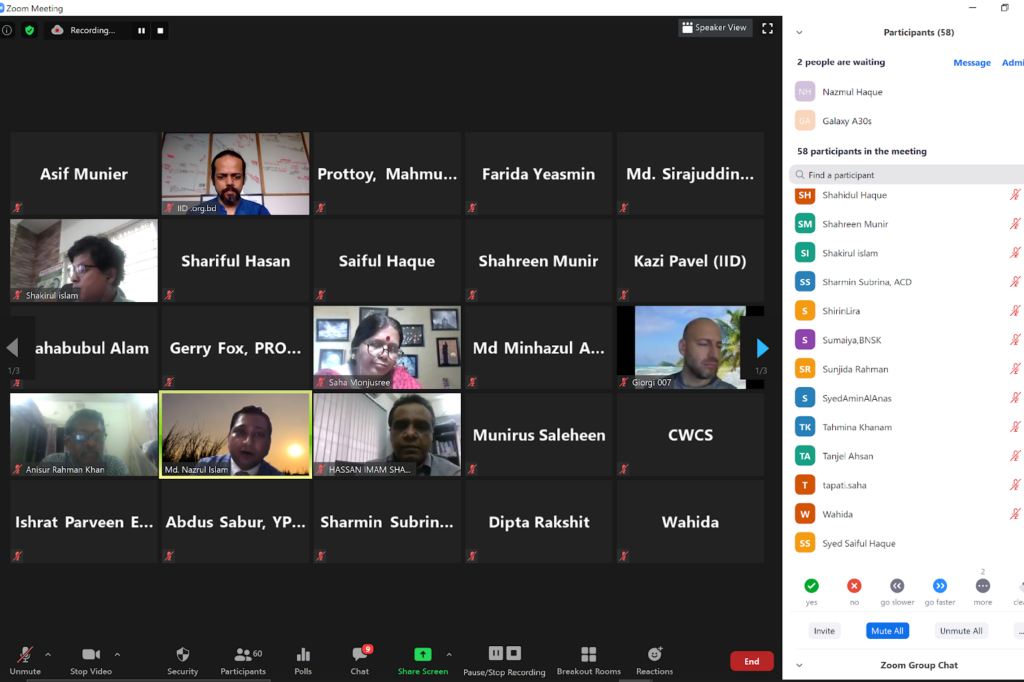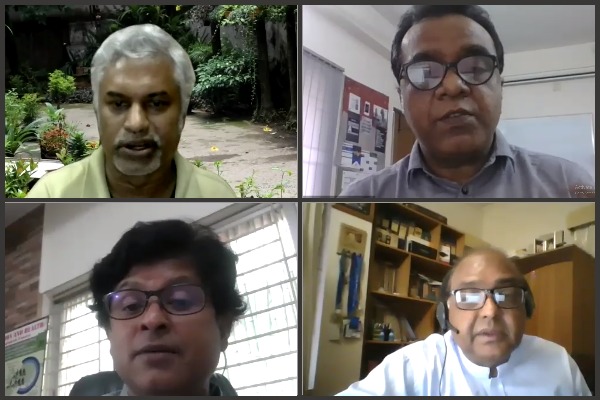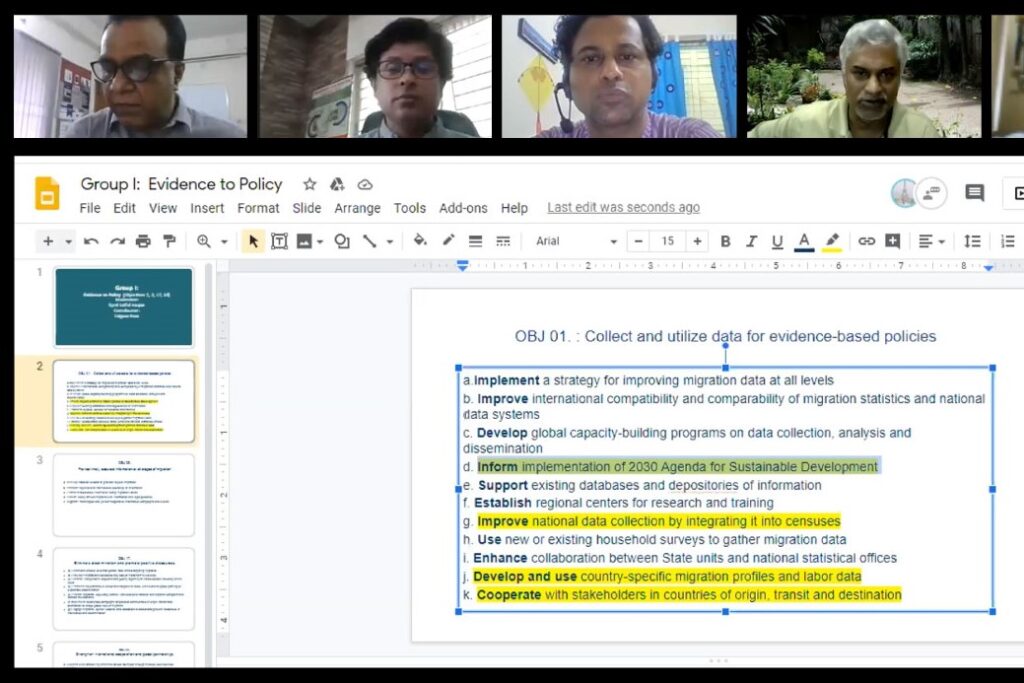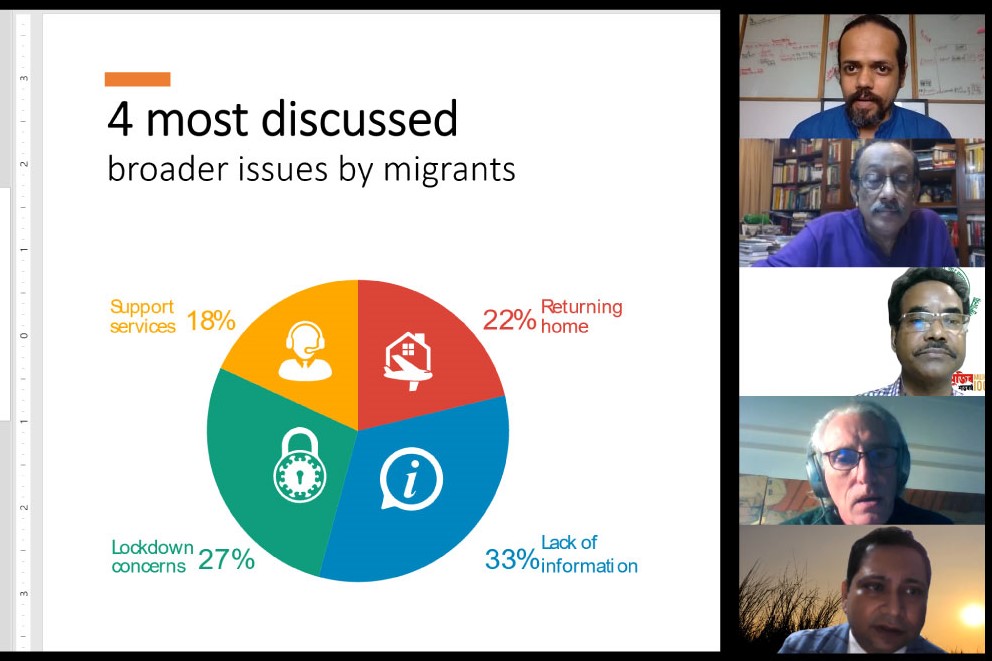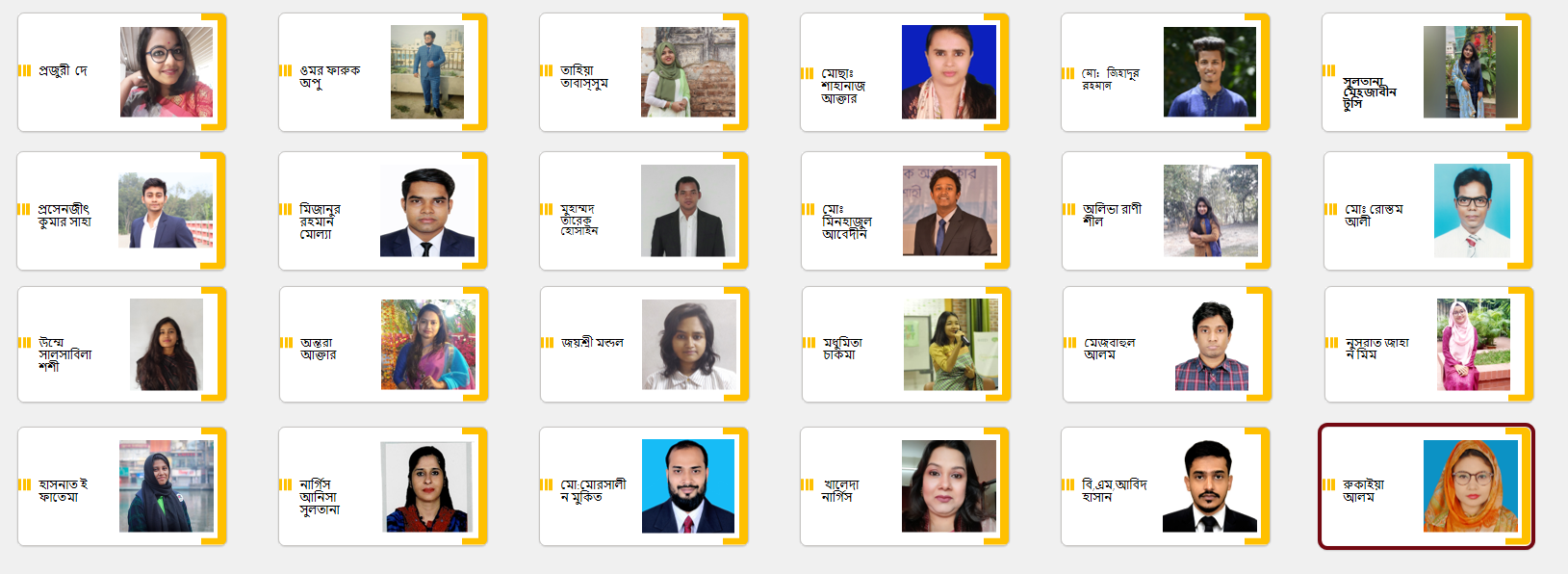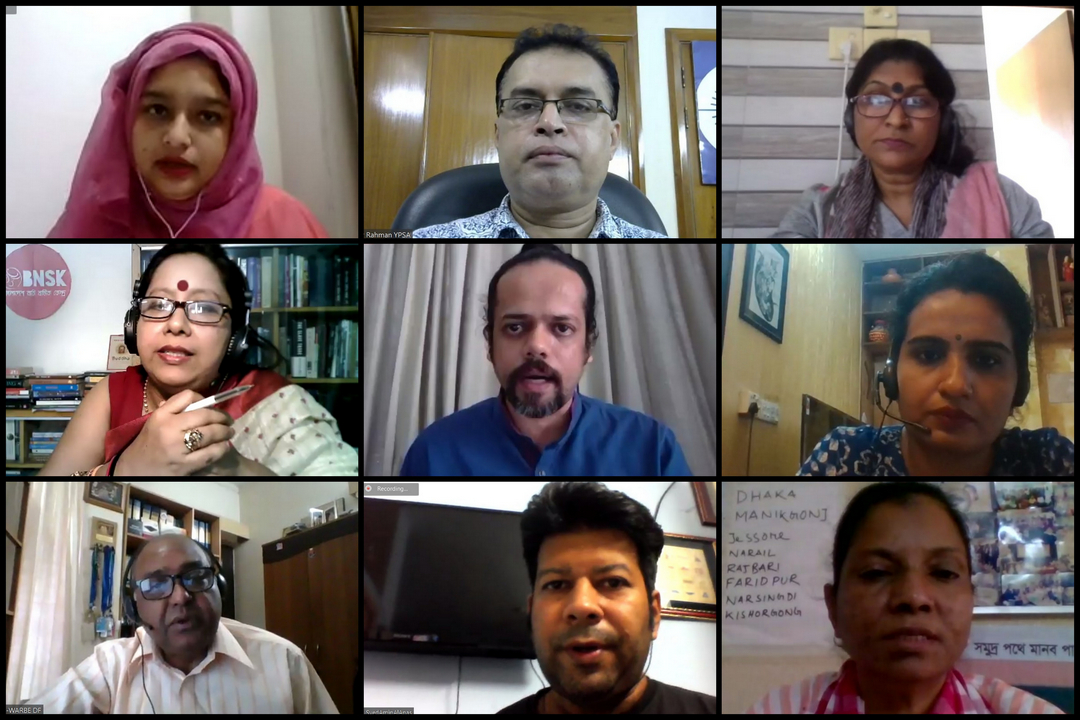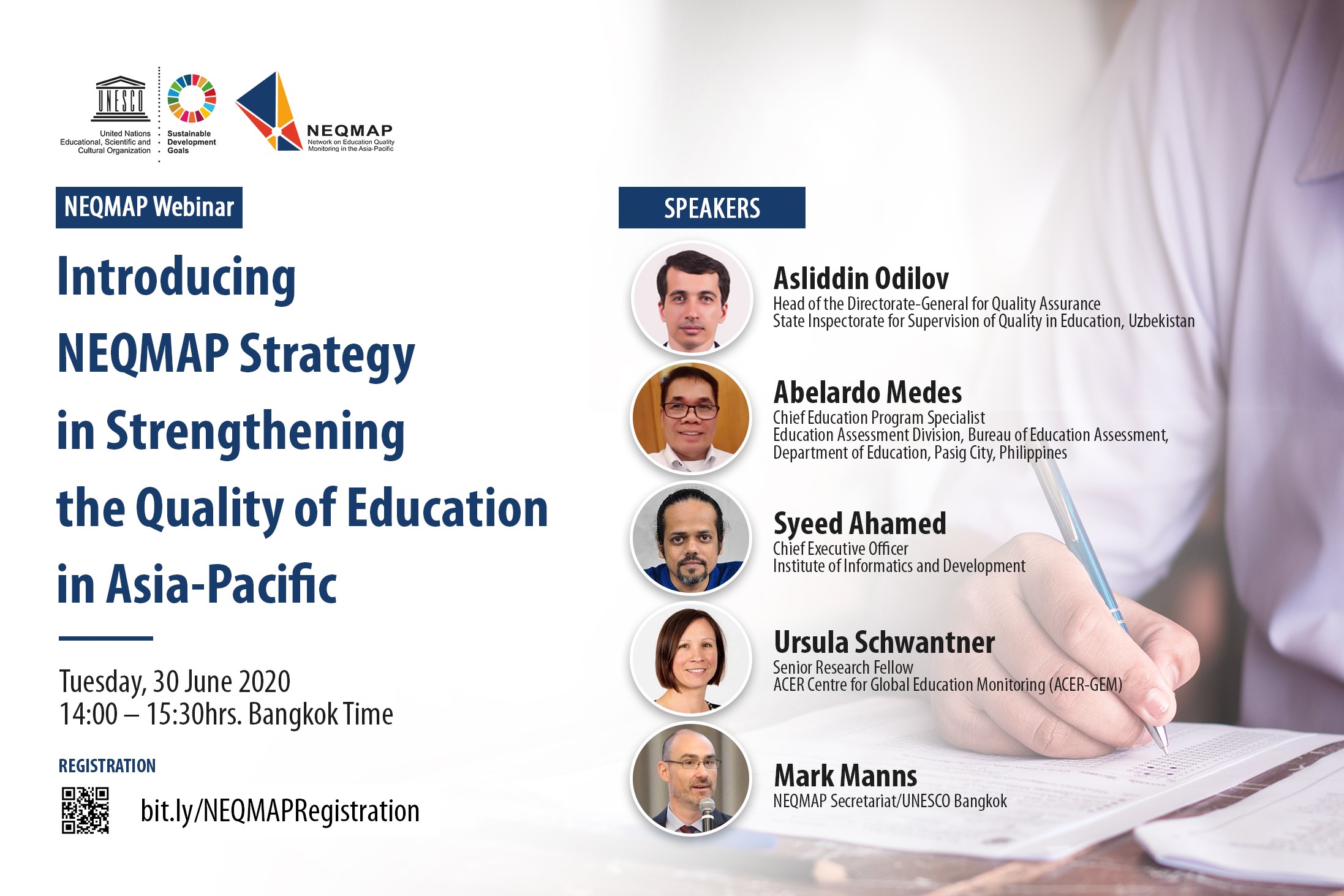The implementation and review of GCM (Global Compact on Migration) is expected to be overseen by an inter-ministerial coordination mechanism, but it is crucial to gather inputs from civil society and relevant actors for drafting the GCM Action Plan and take into account the “new normal” and take concerted efforts to implement all of the objectives and goals of the GCM to ensure safe, orderly and regular migration.
In this context senior government officials, civil society leaders and migrants’ right activists joined together in an e-workshop titled ‘Global Compact for Safe, Orderly and Regular Migration (GCM) National Action Plan & Well-being of Returnees and Migrants Abroad during Pandemic’. The objectives of the e-workshop was to provide civil society inputs to the draft GCM National Action Plan, to prioritize GCM objectives and to gather the perspectives on the well-being of returnees and migrants abroad during the recent pandemic.
Syeed Ahamed from IID, the secretariat of Civil Society for Global Commitments on Migration (CGCM), moderated the e-workshop held this Saturday, 13th June 2020 from 10:00am to 1:00pm. The event was co-hosted by Bangladesh United Nations Network on Migration (BDUNNM) and CGCM.
In his welcoming remarks, Syeed Ahamed, CEO of IID, presented findings of an undergoing study of IID on migrant’s discussion in social media during the pandemic. The study reviewed 34 Facebook groups and pages of Bangladeshi migrants who are living in Malaysia, Kuwait, Qatar, Oman, Saudi Arab, UAE, Italy and Singapore. It was observed that migrants engaged mostly on discussion related to returning to Bangladesh, expiry of visa during lockdown, lack of food, money and jobs, death of migrants by COVID-19, information on flights and embassy, mismanagement of relief and posts on migrants coming forward with help.
Md Shahidul Haque, Former Foreign Secretary and Advisor, urged all to think about a more human and rights-based migration. He emphasized that most countries have not taken adequate measures to ensure that people on the move are safe. But, fortunately we have the cooperative framework agreed upon by GCC countries, the HRC 17 points guideline and the WEF (World Economic Forum) Davos. If we can take out these objectives into clusters for discussions that may provide us an opportunity to reimagine human mobility.
Gerry Fox, Team Leader, PROKAS, noted that we are now suffering from a health, socio-economic and protection crisis altogether. He also mentioned that GCM National Action Plan will be a critical vehicle for responding to both short- and long-term challenges coming with the COVID-19 pandemic. Government, national and international NGOs and civil society must work together and utilize their partnership to address many of these challenges.
Know more about CGCM
Download the draft report on What do Migrants Talkabout
Nazrul Islam, DG of Ministry of Foreign Affairs, stated that although devising the National Plan with GCM prioritisation is a much needed first step, but eventually, our national plan will not work as expected without the implementation of GCM and mechanism at both regional and international level. We must remind the CoD that they are being benefited by our workers and will continue to be and they must be treated fairly, especially in such pressing times.
Ahmed Monirus Salehin, Secretary of the MoEWOE (Ministry of Expatriates’ Welfare and Overseas Employment), suggested that to transform the commitments of the GCM into action during this crisis, local effort must be supplemented by the development partners. He predicted that a situation as critical as this one cannot be handled by the government alone without the support of relevant stakeholders. CSOs, national and international NGOs in the field must bring everything they can offer to the table to combat the pandemic in safeguarding our migrants.
Giorgi Gigauri, Chief of Mission, IOM Bangladesh, mentioned that although our long-term objectives remain the same for the migration sector, one of our biggest challenges now is to balance humanitarian imperatives with economical one. We must keep in mind that the national interests should be served first.
Ahmed Monirus Salehin was the chief guest of the e-workshop, while Md. Shahidul Haque presented the keynote. Other panel members include Shahreen Munir, secretariate of BDUNNM; Sumiya Islam, ED of BNSK; Syed Saiful Haque, Chairperson of WARBE; Shakirul Islam, Chairperson of Ovibashi Karmi Unnayan Program (OKUP); Shariful Hasan, Head of BRAC Migration; Hasan Imam Shaon, Head of Devcom and Anisur Rahman Khan, Director of Awaj Foundation. More than 60 stakeholders of the migration sector including Asif Munier, Anisur Rahman Khan and Nazmul Haque participated in this e-workshop.
In his closing remarks Ahmed Monirus Salehin mentioned that while we all reap the benefits of labour migration’s contribution to the economy, the downfall of it affects us equally as well. He continued by saying that transforming GCM objectives into actions is a big challenge and the government can’t do it alone. We need to address the problem in a holistic approach.

